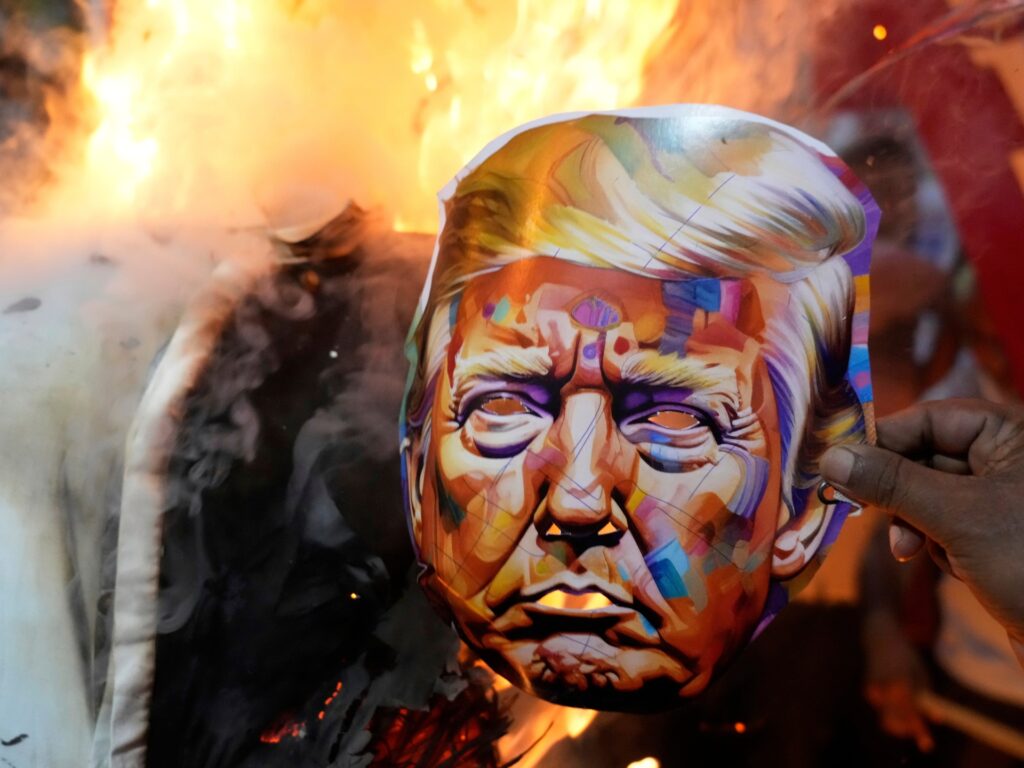A United States appeals court has declared President Donald Trump’s blanket tariff policy illegal, but it stopped short of pausing the wide-ranging import taxes altogether.
On Friday, the Court of Appeals for the Federal Circuit in Washington, DC, largely upheld a decision in May that found Trump had overstepped his authority in imposing universal tariffs on all US trading partners.
Trump had invoked the International Emergency Economic Powers Act (IEEPA) to justify the move, claiming that trade deficits with other countries constituted a “national emergency”.
But the appeals court questioned that logic in Friday’s ruling, ruling seven to four against the blanket tariffs.
“The statute bestows significant authority on the President to undertake a number of actions in response to a declared national emergency,” the court wrote.
“But none of these actions explicitly include the power to impose tariffs, duties, or the like, or the power to tax.”
The Trump administration is expected to appeal to the Supreme Court, and the appeals court therefore said his tariff policy could remain in place until October 14.
That was a departure from the May ruling, which included an injunction to immediately halt the tariffs from taking effect.
What is this case about?
The initial May decision was rendered by the New York-based US Court of International Trade, a specialised court that looks exclusively at civil actions pertaining to cross-border trade.
That case was one of at least eight challenges against Trump’s sweeping tariff policies.
Trump has long maintained that the US’s trading partners have taken advantage of the world’s largest economy, and he has depicted trade deficits – when the US imports more than it exports – as an existential threat to the economy.
But experts have warned that trade deficits are not necessarily a bad thing: They could be a sign of a strong consumer base, or the result of differences in currency values.
Still, on April 2, Trump invoked the IEEPA to impose 10-percent tariffs on all countries, plus individualised “reciprocal” tariffs on specific trading partners.
He called the occasion “Liberation Day“, but critics noted that the global markets responded to the tariff announcements by stumbling downward.
A few days later, as the “reciprocal” tariffs were slated to take effect, the Trump administration announced a pause for nearly every country, save China. In the meantime, Trump and his officials said they would seek to negotiate trade deals with global partners.
A new slate of individualised, country-specific tariffs was unveiled in July in the form of letters Trump posted to his social media account. Many of them took effect on August 1, including a 50-percent tariff on Brazil for its prosecution of a Trump ally, former President Jair Bolsonaro.
Just this week, on August 27, India was also slapped with a 50-percent tariff as a result of its purchase of oil from Russia.
Mexico, Canada and China, meanwhile, have faced Trump’s tariff threats since February, with Trump leveraging the import taxes to ensure compliance with his policies on border security and the drug fentanyl.
What are the arguments?
US presidents do have limited power to issue tariffs in order to protect specific domestic industries, and Trump has exercised that power in the case of imported steel, aluminium and automobile products.
But in general, the US Constitution places the power to issue taxes, including tariffs, under Congress, not the presidency.
Lawsuits like Friday’s have therefore argued that Trump has exceeded his presidential authority in levying blanket tariffs.
The appeals court decision also pointed out that the IEEPA does not give the presidency unchecked power.
“It seems unlikely that Congress intended, in enacting IEEPA, to depart from its past practice and grant the President unlimited authority to impose tariffs,” the ruling said.
The decision came in response to two lawsuits: one filed by the nonpartisan Liberty Justice Center, on behalf of five US small businesses, and the other by 12 US states.
Still, on his social media platform Truth Social, Trump appeared defiant, emphasising that his tariffs would remain in place despite the appeals court’s decision.
“ALL TARIFFS ARE STILL IN EFFECT! Today a Highly Partisan Appeals Court incorrectly said that our Tariffs should be removed, but they know the United States of America will win in the end,” he wrote.
He added that it was his view that tariffs “are the best tool to help our Workers”. He also implied he expected the Supreme Court to back him up in his appeal.
“If these Tariffs ever went away, it would be a total disaster for the Country. It would make us financially weak, and we have to be strong,” Trump said.
“Tariffs were allowed to be used against us by our uncaring and unwise Politicians. Now, with the help of the United States Supreme Court, we will use them to the benefit of our Nation.”
